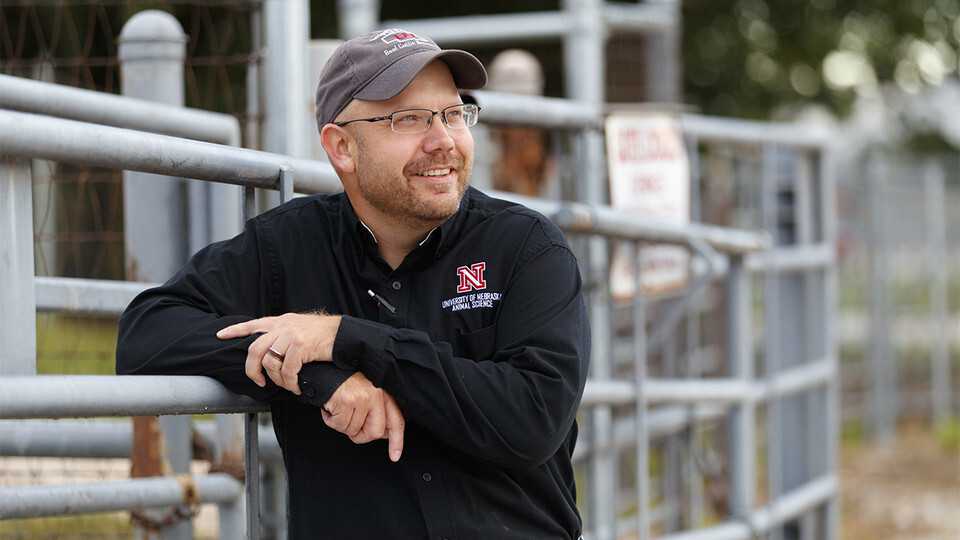
October 3, 2017
Lincoln, Neb. — A University of Nebraska-Lincoln research team will investigate how to improve land use efficiency through the integration of livestock and crop production systems.
The project is funded by a $1 million grant from the Foundation for Food and Agriculture Research.
The team, which includes members of a new Nebraska Beef Systems Research Initiative, expects an integrated system, which overlays cattle grazing with existing crop production systems, to increase output per acre and reduce greenhouse gas emissions associated with production. The team will also examine if the benefits of using cover crops are retained when they are used for livestock forage.
James C. MacDonald, associate professor of animal science and ruminant nutrition at Nebraska, will lead the team in its investigation of various outputs including yields, soil health and greenhouse gas emissions, as well as the economic feasibility of adopting these new practices.
"It's very difficult for new or young farmers to get started," MacDonald said. "You may not own the land or need to work with a family member's existing system to start your own enterprise. Integrating cattle without disturbing crop production with minimal investment can help young producers get started and stay in agriculture."
The availability of perennial forage for livestock production has decreased as farms move to less diversified systems to grow individual crops. Highly specialized systems, such as monoculture, may be less sustainable than diversified approaches in terms of resource efficiency and long-term profitability.
"Cover crops are a long-term investment to improve soil health and reduce erosion, but they can be difficult for producers to pay for," MacDonald said. "If producers can graze cattle on cover crops, they could increase land efficiency and mitigate costs."
Producers will play a vital role in the research by participating in surveys and focus groups to gather input about how they make decisions. Outcomes of this study will help farmers and ranchers understand which practices will help reduce greenhouse gas emissions while efficiently producing food in a diversified system.
U.S. Rep. Don Bacon, who represents Nebraska's 2nd District, said: "As a member of the House Agriculture Committee, I know how important it is for producers to maximize livestock production and increase overall productivity. Nebraska is the number one state for beef and veal exports and for commercial red meat production. This grant will allow the University of Nebraska-Lincoln to contribute to the state's cattle production and research effective land use practices to help new farmers.”
The project is supported by FFAR through its Seeding Solutions grant program, which calls for research proposals in the foundation's seven challenge areas. The grant is part of the Protein Challenge, which aims to enhance and improve the environmental, economic and social sustainability production of diverse proteins for a growing global population.
“As the population continues to expand, we must find more efficient ways to produce enough food to feed the growing population,” said Sally Rockey, Executive Director of the Foundation for Food and Agriculture Research. “FFAR is pleased to support a project that will help efficiently manage resources and provide economic opportunities for American farmers and ranchers.”
The Institute of Agriculture and Natural Resources and the Office of Research and Economic Development at Nebraska matched FFAR's support, resulting in $2.4 million dedicated to this research. The Platte River High-Plains Aquifer Long-term Agroecosystems Research Network is also a partner.
Other team members include Tala Awanda from Nebraska's Agricultural Research Division; Simanti Banerjee and Jay Parsons from the Department of Agricultural Economics; Humberto Blanco and Daren Redfearn from the Department of Agronomy and Horticulture; Mary Drewnoski and Galen Erickson from the Department of Animal Science; Jane Okalebo and Andy Suyker from the School of Natural Resources; and George Burba from LI-COR Biosciences.
The Foundation for Food and Agriculture Research, a 501 (c) (3) nonprofit organization established by bipartisan congressional support in the 2014 Farm Bill, builds unique partnerships to support innovative and actionable science addressing today’s food and agriculture challenges. FFAR leverages public and private resources to increase the scientific and technological research, innovation and partnerships critical to enhancing sustainable production of nutritious food for a growing global population.
James MacDonaldAssociate Professor of Animal Science and Ruminant Nutrition
402-472-6780
jmacdonald2@unl.edu







